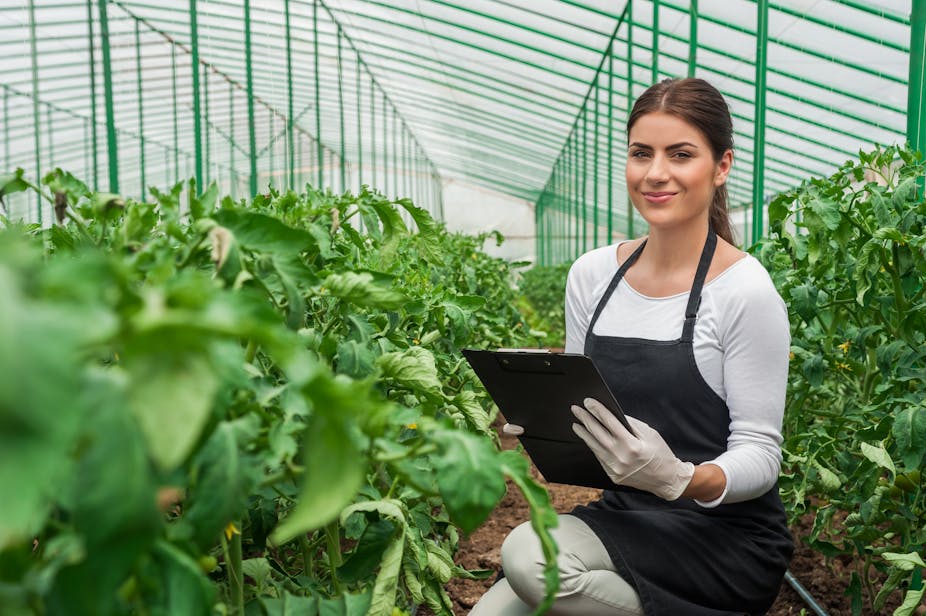Farming is one of many industries facing uncertainty in a post-Brexit world. The way crops and livestock are managed could look very different in the years ahead.
The politician responsible for British agriculture, Andrea Leadsom, recently caused controversy by suggesting British people fill fruit-picking jobs potentially left vacant by migrant workers. But the very notion that young Britons should go “back to the land” to do a job associated with meagre wages, long hours, gruelling, and in some cases slave-like conditions caused a flurry of ridicule.
Indeed, Leadsom’s remarks, and the response they provoked, demonstrate significant confusion about what actually constitutes a career in agriculture. Casual workers make up just 33% of the agricultural workforce, and seasonal fruit and vegetable picking is only one cog in the very complex machine that is farming in the 21st century. Ignoring the majority of the agricultural workforce could be a big mistake.
Farm workers make up less than 1% of the current British workforce. Since around 1850, with the rise in industry drawing people to urban jobs, and the increasing development of technology and machinery, the number of farm workers has declined significantly, from around 1.7m to around 130,000 today.
Over the last ten years this rapid decline in permanent farm workers has somewhat stemmed, partly due to an adaptation of new technology creating new work opportunities. A government review estimated in 2013 that 60,000 new entrants would be needed in the agricultural industry over the next ten years. Yet some farms are already struggling to fill permanent positions, many of which are well-paid with substantial benefits. With only 4% of young people considering a job in food and farming, along with potential Brexit fallout stemming from new policies on immigration, close attention needs to be paid to the agricultural labour force in order to prevent a further crisis.
Research in 2014 for The National Centre for Universities and Businesses revealed that many students are put off working in agriculture due to a poor perception of jobs in the sector. This is despite a study of 1,300 farm workers revealing a happy workforce which largely debunked the myths of the work being low-paid, unskilled or boring.
A large majority of that workforce – 80% – said they would recommend a career in agriculture.

A lack of connection between the agricultural industry and secondary education has also been cited as one of the main issues steering potential workers away from farming careers. My own research among farm workers in south-west England suggests bright young students are often discouraged from pursuing a career in farming by teachers and careers officers.
Many believe that automation will fill the gap created by the lack of availability of labour, replacing human intuition that has been relied upon for centuries, with precision agriculture. But technology and innovation also bring new opportunities, and don’t automatically signal the extinction of the farm worker.
Harvesting new talent
At a crucial point in the agricultural industry, where a potential skilled labour crisis looms large, the old image of agricultural work being back-breaking and intellectually undemanding needs a complete overhaul.
Without access to sufficient labour, many businesses could be forced to move away from labour intensive farming, such as horticulture, dairy, pigs and poultry – or move out of farming altogether.
With the average age of the farm workforce older than 55 and with fewer people crossing the gap from agricultural education to the farm workforce, everything that can be done to attract new entrants into the industry should be done.
Leadsom was right in saying that more young people should be encouraged to “engage in countryside matters”. But by bunching the concept of an agricultural career up with preconceived notions of seasonal labour, she has created a precarious lack of clarity around the issues.

As for encouraging more British workers to pick fruit in the future, if history is anything to go by, this looks unlikely. So, while the potential shortage in seasonal labour need to be urgently addressed, new entrants to the permanent agricultural workforce need to be suitably encouraged, trained and invested in, to secure the future of British agriculture.
In the face of significant challenges such as climate change, an increasing population, and the unpredictability of global markets, the British farming industry needs to be more competitive, sustainable, and resilient than ever.
We need effective schemes and apprenticeships, the provision of the right opportunities by employers, and the establishment of a greater and more informed linkage between schools and farming to provide a sturdy step in the direction of a more secure future for farming.

